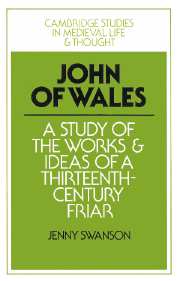Book contents
- Frontmatter
- Contents
- Acknowledgements
- List of Abbreviations
- Introduction
- 1 The career of John of Wales
- 2 The works of John of Wales: sources and technique
- 3 The Breviloquium de Virtutibus Antiquorum Principum et Philosophorum
- 4 Communiloquium, part 1: John of Wales on the state and its members
- 5 Communiloquium, parts 2 and 3: John of Wales on secular society
- 6 Communiloquium, parts 4–7: John of Wales on scholars and churchmen
- 7 Philosophers and saints: the Compendiloquium and Breviloquium de Sapientia Sanctorum of John of Wales
- 8 The works of John of Wales: spread and influence
- Conclusion
- Appendices
- 5 Checklist of early printed editions of works by John of Wales
- Bibliography
- Index
- Frontmatter
- Contents
- Acknowledgements
- List of Abbreviations
- Introduction
- 1 The career of John of Wales
- 2 The works of John of Wales: sources and technique
- 3 The Breviloquium de Virtutibus Antiquorum Principum et Philosophorum
- 4 Communiloquium, part 1: John of Wales on the state and its members
- 5 Communiloquium, parts 2 and 3: John of Wales on secular society
- 6 Communiloquium, parts 4–7: John of Wales on scholars and churchmen
- 7 Philosophers and saints: the Compendiloquium and Breviloquium de Sapientia Sanctorum of John of Wales
- 8 The works of John of Wales: spread and influence
- Conclusion
- Appendices
- 5 Checklist of early printed editions of works by John of Wales
- Bibliography
- Index
Summary
We have considered John of Wales' four earliest preaching aids. How does John himself emerge from this study? Perhaps the strongest characteristic to appear is his depth of commitment and consistency of purpose. Although the four texts are his earliest preaching aids, and seem to predate most of his other surviving work, they are in no sense juvenilia: the first, the Breviloquium de Virtutibus, was written some years after John held the position of lector to the Oxford Franciscans. They are therefore the work of a mature mind, although the first bears signs that the author was feeling his way — coming to terms with an unfamiliar medium.
This coming to terms was accomplished successfully. Communiloquium, on a grander scale in every respect and showing signs of greatly increased confidence, is remarkably faithful to the distinctive characteristics which can be isolated in its predecessor. The stated aim of helping preachers, the faith in the value of classical lore and exempla, the rigorous citation of a wide range of sources (some most uncommon), the enthusiasm for organisation, the clear interest in political systems — all these appear in the Breviloquium de Virtutibus, but blossom and expand in the Communiloquium. Having established a technique in the Breviloquium de Virtutibus, John used it with ease in the Communiloquium, developing and expressing more fully his views on society in general and rulers in particular.
- Type
- Chapter
- Information
- John of WalesA Study of the Works and Ideas of a Thirteenth-Century Friar, pp. 227 - 228Publisher: Cambridge University PressPrint publication year: 1989



